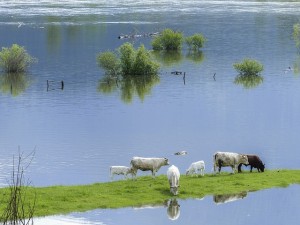Jennifer M. Klein, Esq.
Associate Director & Fellow
 Sea level rise and associated increases in flooding and storm surge should be considered in connection with two planned liquefied natural gas facilities proposed to be built on the coasts of Maine and Louisiana, according to letters submitted today by the Sabin Center for Climate Change Law (SCCCL) to the Federal Energy Regulatory Commission (FERC).
Sea level rise and associated increases in flooding and storm surge should be considered in connection with two planned liquefied natural gas facilities proposed to be built on the coasts of Maine and Louisiana, according to letters submitted today by the Sabin Center for Climate Change Law (SCCCL) to the Federal Energy Regulatory Commission (FERC).
FERC issued a Notice of Intent to Prepare an Environmental Impact Statement for each project earlier this month. The National Environmental Policy Act (NEPA) requires federal agencies to issue Environmental Impact Statements (EISs) for major federal actions that may significantly affect the quality of the human environment. As a preliminary step, agencies are required to public a Notice of Intent (NOI), which must provide a description of the proposed project and invite comments regarding the scope of the EIS.
SCCCL’s scoping comments take no position on the export of liquefied natural gas or on whether the projects should be approved. Instead, since the scoping process is intended to help agencies identify significant issues for consideration, SCCCL focuses on a critical issue that was not identified in either of FERC’s NOIs – the potential impact of climate change on the proposed projects. Specifically, SCCCL argues that sea level rise and storm surge pose significant risks to coastal zones in the Northeast and Southeast United States and maintains that the projects at issue – which will bring large ships carrying highly combustible cargo to the project sites – should plan accordingly.
Although EISs typically examine the effect of a proposed action on the environment, the use of NEPA to encourage consideration of how the environment might affect a project has gained momentum in recent years. This type of “reverse environmental impact” analysis can promote adaptation to climate change in vulnerable areas, thereby ameliorating the projected physical impacts of climate change on our infrastructure, economy, and communities.


